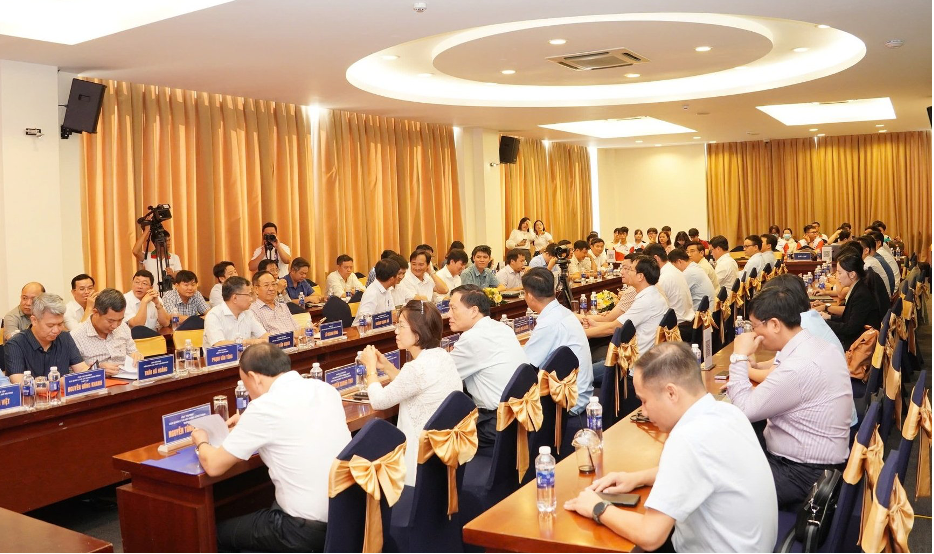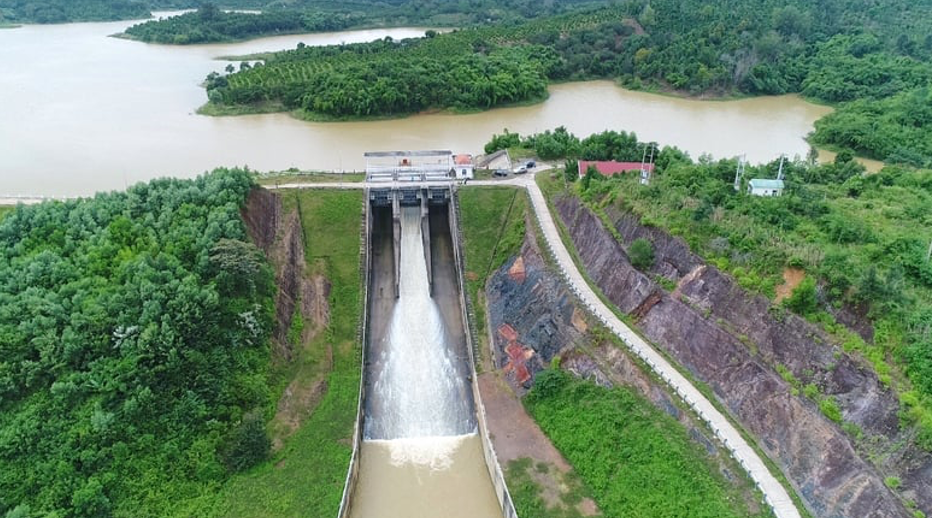From app-based alerts to AI-powered forecasting, Vietnam’s irrigation sector is entering a new era of data-driven management—aiming to boost efficiency, reduce climate risks, and strengthen national water security under Resolution 57.
On Oct. 17, the Department of Irrigation Works Management and Construction (Ministry of Agriculture and Environment), in coordination with the Agriculture and Environment Newspaper, held a forum titled “Science, Technology, and Digital Transformation in the Management and Operation of Irrigation Works to Implement Resolution 57.”
The forum served as a critical platform for experts, managers, and scientists to discuss the pathway for modernizing one of Vietnam's most essential sectors, moving from traditional operation to a smart, data-driven governance model.
 The forum "Science, Technology, and Digital Transformation in the Management and Operation of Irrigation Works to Implement Resolution 57".
The forum "Science, Technology, and Digital Transformation in the Management and Operation of Irrigation Works to Implement Resolution 57".From app-based alerts to ai-powered forecasting
Speaking at the forum, Dr. Le Ngoc Hieu of the Southern Institute of Water Resources Research explained that the initial phase of digitalization, which began in 2020, has already yielded significant benefits. The introduction of alerts through digital platforms like mobile apps and websites marked a major step forward in supporting both agricultural production and operational management.
“These applications help farmers plan their planting schedules appropriately and provide management agencies with accurate operational data, especially during peak saltwater intrusion periods in the Mekong Delta,” Dr. Hieu stated.
However, he argued that to meet the new and escalating demands of the climate change era, the sector must advance significantly. He called for the application of artificial intelligence (AI) and Digital Twin models as the next frontier in irrigation governance.
The institute’s research team has already developed a "Hybrid AI" model capable of forecasting upstream river flows into Vietnam, specifically at the Tan Chau and Chau Doc monitoring stations, with a lead time of 7 to 30 days. This model utilizes deep learning, allowing it to "self-learn" from vast, complex datasets of rainfall, current flows, and salinity levels, delivering high-accuracy results in just a few seconds.
“The application of deep learning for flood and saltwater intrusion forecasting holds not only scientific value but also immense practical significance, aligning with the spirit of Resolution 57 regarding breakthroughs in science, technology, and national digital transformation,” Dr. Hieu affirmed.
He elaborated that AI will help overcome the significant limitations of traditional hydraulic models, such as the widely-used MIKE models. These older systems are often slow, computationally intensive, demand extensive input data, and lack the flexibility needed for real-time operational decisions.
In parallel, Dr. Hieu advocated for the construction of a comprehensive "Digital Twin" for the entire irrigation network of the Mekong Delta. This virtual replica of the physical system would allow management agencies to simulate, test, and optimize various operational scenarios in a risk-free digital environment before implementing them in the real world.
The result, he concluded, would be a shift to more proactive management, significantly reduced risk, cost savings, and a robust enhancement of overall water resource governance.
Charting a course toward a smart, sustainable sector
Mr. Nguyen Tung Phong, Director of the Department of Irrigation Works Management and Construction, provided the government's perspective, arguing that investment in smart irrigation must be intrinsically linked to multi-functional objectives.
He explained that this approach must serve not only agricultural production but also domestic water supply, disaster prevention, and environmental protection. "This process must extend beyond the initial investment to include post-investment maintenance, ensuring synchronization and long-term effectiveness," Phong stated. He also highlighted the critical need to improve human resource quality by training engineers and operators in advanced digital skills.
Director Phong emphasized that digital transformation must be comprehensive, beginning with forecasting and investment mindsets and extending through operational management to the construction and exploitation of a shared national database.
“In the near future, our Department will coordinate with the Department of Digital Transformation to establish a system of standards and technical regulations," Phong announced. "We will complete a comprehensive, accurate database ready for two-way sharing between central and local authorities. Furthermore, all sectors, levels, and localities must synchronize their efforts to build a smart, adaptive, and sustainable irrigation system for the digital age”.
Prof. Dr. Le Manh Hung, Chairman of the Ho Chi Minh City Association of Water Resources and Irrigation Science and Technology, issued a strong warning against fragmentation, which he sees as a major obstacle. He urged the sector to continue refining a centralized management platform.
This platform, he argued, must ensure synchronization from hardware to software and from technical norms to financial governance frameworks. “We cannot allow each locality and unit to use different types of equipment and software," Prof. Hung stressed. "It is a major failing to manage a sector in a way that requires opening dozens of separate apps and fragmented systems”.
One of the key solutions, according to Prof. Hung, is to establish a single, standardized framework. This framework would classify specific types of works, tasks, and equipment, allowing for clear mandates to be assigned to research units, implementation consultants, and local authorities. "Only with such a synchronized and transparent foundation will the allocation of resources and budget proposals from the central to local levels become feasible and sustainable", he concluded.
Offering a pragmatic view, Mr. Nguyen Hong Khanh, the department's Deputy Director, confirmed that the Ministry of Agriculture and Environment is developing a master framework to clearly delineate the responsibilities of central and local authorities.
 Increasingly complex climate change and rising water demand require the strong application of science and technology in irrigation work operations. Photo: VGP.
Increasingly complex climate change and rising water demand require the strong application of science and technology in irrigation work operations. Photo: VGP.However, he insisted that the transition must follow a practical, phased-in roadmap. “In some places, even electrification is not yet complete, so we cannot be overly ambitious with digital transformation," Khanh noted. "The priority is to proceed in the correct sequence - determining which tasks come first and which come later - to ensure sustainability.”
The consensus of the forum was clear: If implemented correctly and strategically, digital transformation will be the key to helping Vietnam’s irrigation sector transition to a modern management phase. This shift will conserve vital resources, reduce risks from climate change, and actively contribute to the national goals of ecological agriculture and emissions reduction, fully aligning with the spirit of Resolution 57 on national science, technology, and innovation development.